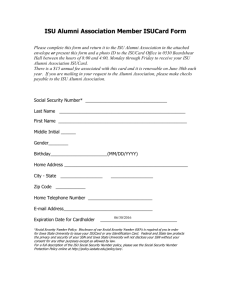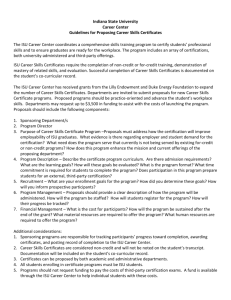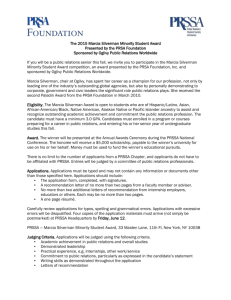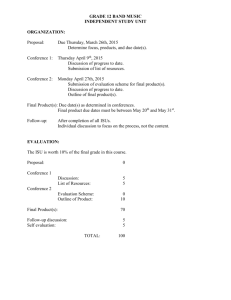PRSSA Constitution - School Of Communication
advertisement
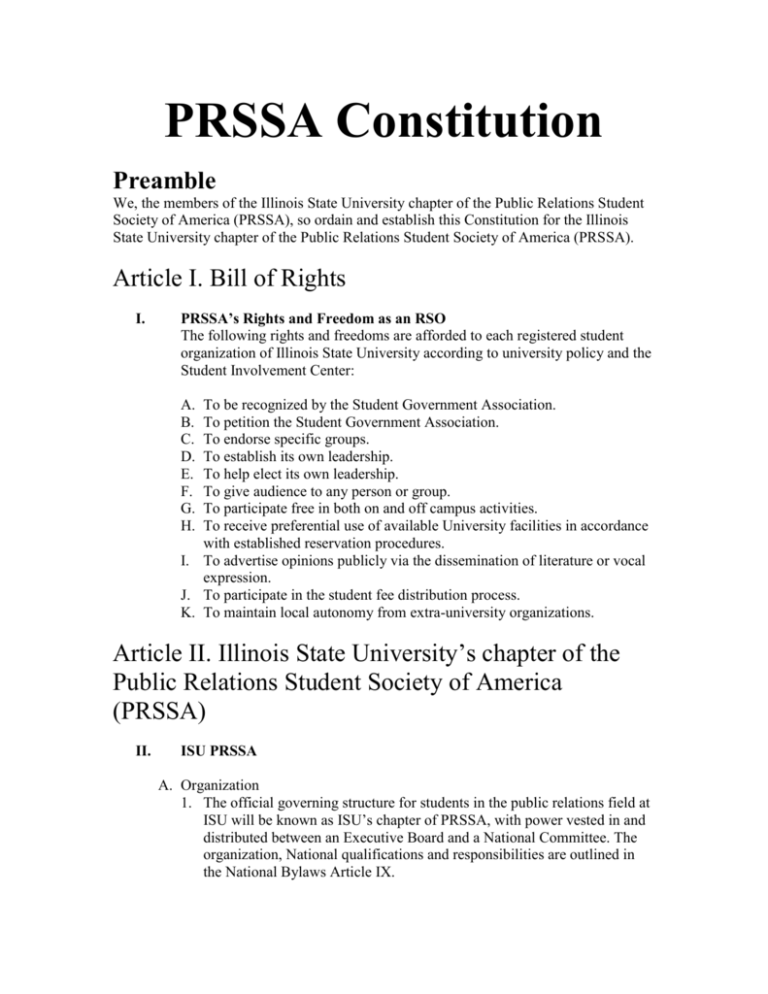
PRSSA Constitution Preamble We, the members of the Illinois State University chapter of the Public Relations Student Society of America (PRSSA), so ordain and establish this Constitution for the Illinois State University chapter of the Public Relations Student Society of America (PRSSA). Article I. Bill of Rights I. PRSSA’s Rights and Freedom as an RSO The following rights and freedoms are afforded to each registered student organization of Illinois State University according to university policy and the Student Involvement Center: A. B. C. D. E. F. G. H. To be recognized by the Student Government Association. To petition the Student Government Association. To endorse specific groups. To establish its own leadership. To help elect its own leadership. To give audience to any person or group. To participate free in both on and off campus activities. To receive preferential use of available University facilities in accordance with established reservation procedures. I. To advertise opinions publicly via the dissemination of literature or vocal expression. J. To participate in the student fee distribution process. K. To maintain local autonomy from extra-university organizations. Article II. Illinois State University’s chapter of the Public Relations Student Society of America (PRSSA) II. ISU PRSSA A. Organization 1. The official governing structure for students in the public relations field at ISU will be known as ISU’s chapter of PRSSA, with power vested in and distributed between an Executive Board and a National Committee. The organization, National qualifications and responsibilities are outlined in the National Bylaws Article IX. 2. The chapter shall abide by the Illinois State University Registered Student Organization rules and regulations. B. Affiliation 1. All undergraduate and graduate students not having full-time administrative, faculty, and/or civil status at Illinois State University are members of the student body, and, as such, are eligible to become members of ISU’s chapter of PRSSA and participate in its deliberations and activities. C. Purpose 1. To represent the needs and interests of the public relations field, PRSSA, the School of Communication and the student body through Assembly Legislation and positions of advocacy 2. To proactively effect change in the best interest of the public relations field, PRSSA, the School of Communication and the student body 3. To address issues affecting members of the public relations field, PRSSA, the School of Communication and the student body 4. To provide services to meet students’ needs 5. To build a vital and thriving public relations major and School of Communication for the university community 6. To further the cultural, social and physical growth of the public relations field, PRSSA, the School of Communication and the student body 7. To recognize outstanding achievement by students and committees Article III. Administration III. Administration A. Membership and Qualifications 1. The executive branch of ISU’s chapter of the PRSSA shall be known as the Executive Board. The Executive Board will be composed of the executive officers. a. The executive officers are the President, Vice President, National Liaison, Secretary, Treasurer and Historian. b. Each executive officer shall oversee and serve as the executive advisor of one of the internal committees of ISU’s chapter of the PRSSA. c. When necessary, any executive officer shall oversee and serve as executive advisor for any ad hoc committee created for ISU’s chapter of the PRSSA. 2. All executive officers shall be members of the student body and shall be in good academic and disciplinary standing at the time of appointment on the board. a. Each executive officer must be a dues-paying member of the PRSSA. b. No executive officer may hold his/her ISU’s chapter of the PRSSA position concurrently with an office at the National level with exception of the transition period between offices. c. Credentials for holding any executive position must be kept and updated regularly for the purposes of selecting the best person for each position and to guide office holders in their application of their skill sets to the demands of their work. Position-related credentials must be prepared/revised in consultation with and approved by the faculty advisor. d. Executive Board members must prepare and contribute to an “Executive Board Policies and Procedures Manual” in consultation with and approved by the faculty advisor. This manual documents position-specific details to help in-coming Executive Board members fulfill their Constitutional duties. B. Authority, Powers and Responsibilities of the Executive Board 1. The President shall have the following authority, powers and responsibilities a. To abide by, enforce and support the chapter’s constitution, National Bylaws and ISU Registered Student Organization rules and regulations. b. To exercise overriding executive authority within his/her administration, as well as delegate assignments to other officers, internal committee chairs, as necessary c. To supervise the operations of the chapter’s executive officers and internal committees d. To serve as the chief student official and spokesperson for the chapter e. To faithfully execute the policies and legislation at the chapter and national level f. To serve as a member of all internal committees g. To regularly meet with and accept reports from all chapter officials h. To nominate and, with the advice and consent of the Assembly, appoint students to vacant positions, as provided for in the Constitution or the Bylaws. i. To veto legislation deemed not in the best interests of the chapter. j. To advise the chapter’s faculty advisor on issues affecting students. k. To perform other duties as assigned by the Assembly or the faculty advisor. 2. The Vice President shall have the following authority, powers and responsibilities: a. To abide by, enforce and support the ISU’s chapter of the PRSSA Constitution, National Bylaws and ISU Registered Student Organization rules and regulations. b. To serve as acting president in the absence of the president. c. To generally assist the president with the management and supervision of the Executive board and internal committees. d. To advise the president on all personnel appointments. e. To be advise the president on matters pertinent to the assembly, School of Communication and student body. f. To perform other duties as assigned by the president, assembly or faculty advisor. 3. The National Liaison shall have the following authority, powers and responsibilities: a. To abide by, enforce and support the ISU’s chapter of the PRSSA Constitution, National Bylaws and ISU Registered Student Organization rules and regulations. b. To plan National Conference and all other traveling functions open to the Assembly as a whole. c. To plan chapter dinners and affiliation with professional dinners. d. To maintain contact with PRSA professionals and arrange speakers and job shadow opportunities. e. To advise president on matters pertinent to the Assembly, School of Communication and student body. f. To perform other duties as assigned by the president, the Assembly or faculty advisor. 4. The Secretary shall have the following authority, powers and responsibilities: a. To abide by, enforce and support the ISU’s chapter of PRSSA Constitution, National Bylaws and ISU Registered Student Organization rules and regulations.. b. To maintain Assembly meeting minutes and email them to members after each meeting. c. To email all meeting updates at least two days before a meeting. d. Make announcements of all decisions made and upcoming events. e. To advise president on matters pertinent to the Assembly, School of Communication and student body. f. To perform other duties as assigned by the president, the assembly or faculty advisor. 5. The Treasurer shall have the following authority, powers and responsibilities. a. To abide by, enforce and support the ISU’s chapter of PRSSA Constitution, National Bylaws and ISU Registered Student Organization rules and regulations.. b. To serve as the fiscal officer for the chapter, maintaining accurate financial records of all disbursements and receipts and uploading the fiscal integrity of ISU’s chapter of the PRSSA. c. To authorize expenditures consistent with the appropriated budget. d. To advise president on matters pertinent to the Assembly, School of Communication and student body. e. To perform other duties as assigned by the president, the Assembly or faculty advisor. 6. The Historian shall have the following authority, powers and responsibilities. a. To abide by, enforce and support the ISU’s chapter of the PRSSA Constitution, National Bylaws and ISU Registered Student Organization rules and regulations.. b. To take pictures of all events and formulate a scrapbook summarizing the year. c. To serve as webmaster of the chapter, maintaining all relevant information to the Assembly. d. To collect any media clippings or public recognition of the chapter. e. To manage the chapter’s social media accounts including Facebook, Twitter, LinkedIn and Flickr. f. To plan at least one philanthropic event per month. g. To advise president on matters pertinent to the Assembly, School of Communication and student body. h. To perform other duties as assigned by the president, the Assembly, or faculty advisor. Article IV. The Assembly A. Chapter Dues 1. ISU’s chapter of the PRSSA reserves the right to change dues at the beginning of each school year. Chapter dues are designated by the incoming Executive board based on national dues requirements plus the chapter’s projected financial needs for the upcoming year. B. Membership 1. ISU’s chapter of the PRSSA other membership information is outlined in the National bylaws. 2. The Assembly as a whole shall have the following authority, powers and University community and its mission. a. To support the School of Communication while also supporting the University community and its mission. b. To represent the chapter to the University and local community. c. To initiate programs and services in accordance with the University guidelines. d. To enact legislation, resolutions and policies on behalf of and in the best interests of the society at the local level. e. To accept reports from the administration, internal committees, the School of Communication and members of the University community. f. To override a presidential veto. g. To provide applicants for Executive Board officers of the President, the Vice President, National Liaison, Secretary, Treasurer and Historian. h. To abide by and support the ISU PRSSA Constitution, National bylaws and ISU Registered Student Organization rules and regulations. i. To represent the University and public relations field professionally and responsibly. j. To advance the profession and future professional. k. To recommend Assembly members for leadership positions in the chapter. l. To execute binding votes on matters before the Assembly. m. To perform other duties as assigned by the president, the Assembly, or faculty advisor. Article V. Committees A. Internal Committees 1. Membership on internal committees is afforded to PRSSA executive officers and Assembly. 2. All internal committee members shall have equal voice in internal committee proceedings. 3. Every attempt should be made to reach consensus on any decision before an internal committee. 4. All meetings of the executive committee shall be conducted in executive session, with guests permitted only with the consent on a majority of the committee’s membership and presidential approval. The faculty advisor may attend any meetings at his/her discretion or invitation of committee directors. B. Internal committees 1. The PRogressive Image, student-run firm, Director shall have the following authority, powers and responsibilities: a. To abide by, enforce and support the ISU’s chapter of the PRSSA Constitution, National bylaws and ISU Registered Student Organization rules and regulations. b. To maintain regular contact with clients and act as professional practitioners of public relations. c. To recruit clients from the community, within the university and other. d. To report to the executive board advisors with all major decisions made and client updates. e. To advise the executive board advisors on matters pertinent to the Assembly, School of Communication and student body. f. To perform other duties as assigned by the president, the Assembly, or the faculty advisor. g. The Relations Director shall have the following authority, powers, and responsibilities: i. To abide by, enforce and support the ISU’s chapter of the PRSSA Constitution, National bylaws and ISU Registered Student Organization rules and regulations.. ii. To maintain regular contact with alumni and act as professional practitioners of public relations. iii. To plan chapter social events. iv. To report to the executive board contacts with all major decisions made and newsletter updates. v. To advise the executive board contacts on matters pertinent to the Assembly, School of Communication and student body. vi. To perform other duties as assigned by the president, the Assembly, or the faculty advisor. h. The Development Director shall have the following authority, powers and responsibilities: i. To abide by, enforce and support the ISU’s chapter of the PRSSA Constitution, National bylaws and ISU Registered Student Organization rules and regulations.. ii. To maintain regular contact with other committees and aid them in needed fundraising. iii. To act as professional practitioners of public relations. iv. To create innovative and creative ways of fundraising for the chapter. v. To advise the executive board contacts on matters pertinent to the Assembly, School of Communication and student body. vi. To perform other duties as assigned by the president, the Assembly, or the faculty advisor. C. Ad Hoc Committees 1. Ad hoc committees may be created for the purposes of conducting preliminary deliberation on legislative matters or for making purposes of conducting preliminary deliberation on legislative matter or for making specific recommendations to the Assembly when the focus of the committee is not consistent with the authority, powers or responsibilities of an internal committee. 2. Ad hoc committee chairpersons shall be afforded the same authority, powers and responsibilities of an internal committee chairperson. 3. Ad hoc committee chairs must abide by, enforce and support the ISU’s chapter of the PRSSA Constitution, National bylaws and ISU Registered Student Organization rules and regulations. 4. Ad hoc committees shall receive their charges and/or direction from one of the Executive board members. Article VI. Elections A. Executive board officers 1. The president, vice president, national liaison, secretary, treasurer and the historian will be selected by the current executive board and advisor. 2. Only dues paying members are eligible to run for office. 3. Candidates will go through an application and interview process to be selected on the executive board. 4. Applications will include a written application. Two letters of recommendation from dues paying members are encouraged but not required. 5. The executive board and advisor will select candidates for interview. Then, the executive board and advisor will select the new executive board by a majority vote. 6. Any current executive board member applying for the same or different executive board positions for the next year cannot participate in the interview and approval process for applications 7. In the situation where three or more executive board members apply for the same and/or different executive board positions for the next year, all such applicants will be recused from the interview and approval process, and the President shall create a special ad hoc committee of the directors of the internal committees to participate in the interview and approval process with the faculty advisor. If the committee directors are running for the office, the president and faculty advisor will appoint members from other PRSSA leadership positions to serve on the ad hoc committee. 8. In the event of unforeseen circumstances in the selection process for chapter leadership positions, the faculty advisor will be charged with the responsibility for designing a process for resolving the matter. Article VII. Operations and Procedures A. Attendance and Participation Requirements 1. Each Executive Board Officers shall be required to participate fully in or assist with all activities, functions, operations, and official meetings sponsored or cosponsored by the ISU chapter of the PRSSA or at the request of the president. 2. Each Committee Chair shall be required to participate fully in or assist with all activities, functions, operations, and official meetings sponsored or cosponsored by the ISU chapter of the PRSSA, at the request of the President or of other Executive Board Members. 3. Each Assembly member shall be urged to participate fully in or assist with all activities, functions, operations, and official meetings sponsored or cosponsored by the ISU chapter of the PRSSA, at the request of the President or of other Executive Board Members. B. Summer Assembly 1. The Summer Assembly will consist of the Executive Board, which will, under the terms of this Constitution, conduct any necessary chapter business during the summer months, including preparations and strategic planning for the upcoming academic year. Assembly members may participate or be invited to participate as needed., Article VIII. Removal and Revocation A. Recall 1. Any chapter executive board officer may be recalled from office by his/her constituents. The procedure for removal through recall is as follows: a. A petition for recall signed by 25percent of the Assembly or the President. b. Upon submission of the recall petition, the President or Vice President shall convene a special hearing for all members of the charged member's constituency. At this hearing, the charged Executive Board officer shall present his/her case to his/her constituents. The faculty advisor may be present to monitor and advise the proceedings. c. After the special hearing has occurred, the president or vice president shall initiate a recall referendum. d. An elected SGA member shall be recalled from office if a majority of the charged Assembly vote in favor of recall, a quorum must be present. e. No individual who has served less than one month shall be eligible for recall. f. No individual may be considered for recall on the same charge in a single term. g. If an executive officer is recalled from office, the respective executive board office shall be immediately considered vacant. B. Impeachment 1. Any executive board officer may be removed from office by impeachment. The procedure for removal through impeachment is as follows: a. A motion to impeach an individual for negligence or irresponsibility must be adopted by a majority of the total membership of the Assembly. b. If a motion to impeach is adopted by a majority, then the President or the Vice President shall convene a special hearing for the Assembly. At this hearing, the case against the impeached executive board officer shall be presented. The impeached individual shall have the opportunity to present a defense against the charges. The faculty advisor may, at the discretion of the executive board and/or the Assembly, lead the special hearing and all impeachment proceedings. c. At the next Assembly meeting subsequent to the hearing, the accusing party must move to convict the impeached member. The impeached member shall have the opportunity to address the Assembly before a vote is taken. The impeached member may be convicted by a two-thirds (2/3) vote of the total membership of the Assembly. d. No individual may be impeached more than once on the same charge. e. No Assembly member may vote on a motion to impeach or a motion to convict in which he/she is named. f. No motion to impeach shall be in order if the motion names more than one executive board member. g. If an executive officer is impeached and convicted, the respective office shall be immediately considered vacant. C. Dismissal 1. The President may dismiss any committee director or head from her or his position for negligence or irresponsibility in performing assigned duties. If a committee headis dismissed, his/her position shall be considered vacant. The President may dismiss other officers with the approval of the Faculty Advisor, but a formal explanation must be presented to the Assembly giving reason of dismissal. Article IX. Succession and Vacancies A. Executive Session 1. In the event that the President is unable to fulfill his/her duties due to extended illness, absence or other emergency circumstance, the Vice President shall serve as the Acting President. 2. In the event that the office of President is vacated due to resignation, removal, or disqualification from office, the Vice President shall automatically become the President. The office of the Vice President shall then be considered vacant. 3. In the event any other office other than the President’s is vacated, the President shall fill the vacant position by nomination and appointment as prescribed by this Constitution in Article IX.B. 4. In cases where the Vice President cannot serve as the President, or when the office of President is vacated due to resignation, removal, or disqualification from office and cannot be filled by the vice president, the order of succession then shall be respectively the national liaison, the secretary, the treasurer, the historian, and then an internal committee chair as determined by the Assembly. B. Filling Vacancies 1. To fill any vacant executive board office, the president shall nominate and, with the advice and consent of the Assembly, in cooperation with the faculty advisor, appoint a qualified student to fill the vacancy. A student shall immediately assume the duties of his/her respective office or position after confirmation by the Assembly and receipt of the oath of office from the president in the presence of the Assembly. Article X. Constitution, Bylaws & Amendments A. Constitution 1. Upon effective ratification by the ISU chapter of PRSSA's Assembly, this Constitution shall supersede all rules set forth in previous Constitutions. However, in cases where this Constitution conflicts with the University Constitution, the University Constitution shall prevail. B. Bylaws 1. The ISU chapter of the PRSSA Assembly may create Bylaws to enumerate rules and procedures in addition to those set forth in this Constitution. However, in cases where the Bylaws conflict with this Constitution, this Constitution shall prevail. C. Amendments 1. This Constitution may be amended or revised by a majority of the voting student body of dues-paying chapter members. a. Any chapter member may introduce proposed amendment(s) to the Constitution at any regular Assembly meeting. At said meeting, the proposed amendment(s) shall undergo a first reading. b. At the next regular Assembly meeting, the proposed amendment(s) shall undergo a second reading. After the second reading, the amendment(s) may be submitted to the Assembly in the form of a preliminary referendum for ratification of a simple majority of members present. D. The National Bylaws amendment procedures are outlined in the National Bylaws document. Ratified: November 9, 2010

